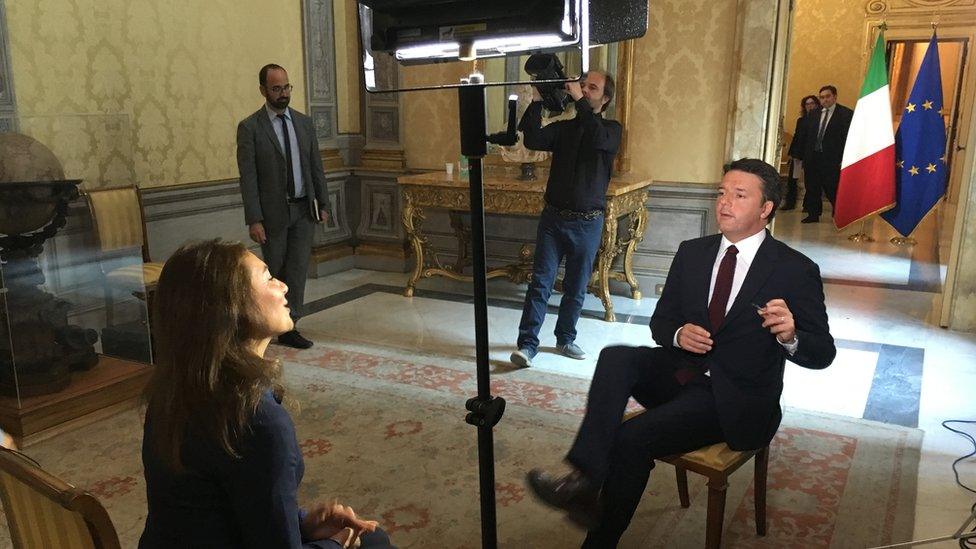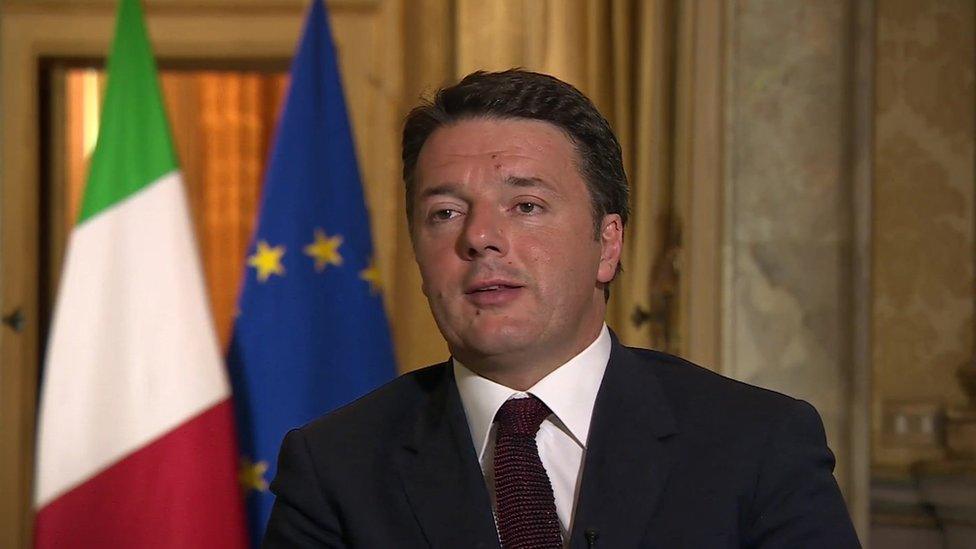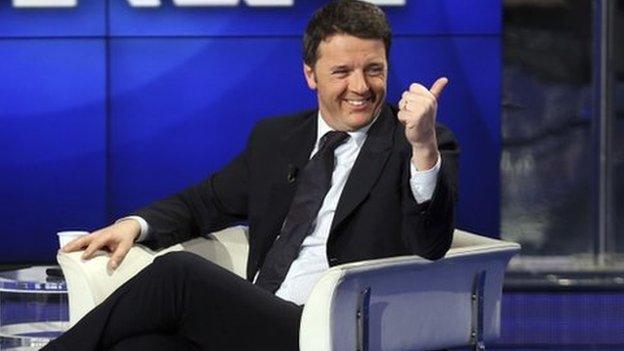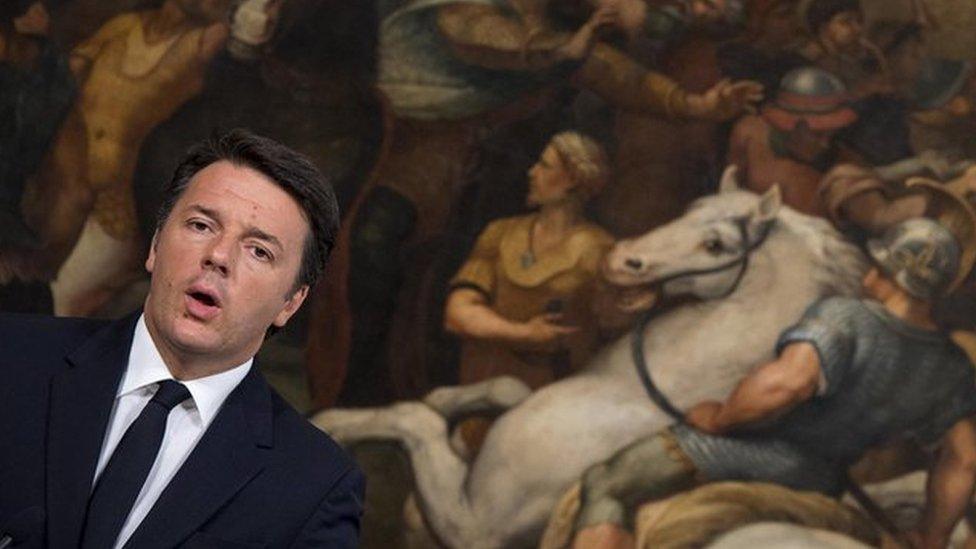Italian PM Renzi's Brexit blues and risky referendum
- Published

Switch on an Italian TV chat show at any time of day or night and you'll be treated to a staple of raised voices, righteous indignation and rowing.
Regardless of the topic of discussion.
"He's clearly attempting a coup d'etat!" yells one centre right MP to a lunchtime studio audience on a TV chat show, veins bulging angrily out of his neck.
He means Italy's prime minister, Matteo Renzi. He is the current focus of discussion because he just called a referendum on constitutional reform.
The campaign kicks off officially this evening but, whatever the political message, this threatens to turn into a Renzi referendum- a vote on the man himself and his two and a half years in office to date.
"Yes, it's risky," Prime Minister Renzi told me on Wednesday as we sat in an ornate and frescoed room of Palazzo Chigi, the Italian equivalent of 10 Downing Street.

Mr Renzi is known as a reformer but will these constitutional changes be a reform too far?
"But it's impossible to implement change in Italy without risk and I am confident."
I put it to Mr Renzi that David Cameron had been confident too ahead of the UK referendum on EU membership but that he ended up losing the vote and his political career into the bargain.
"Thanks for the warning!" Mr Renzi laughed. "But joking aside, I think few Italians will say no to reducing bureaucracy and politicians' salaries. It's good for Italians so I'm not worried."
I found myself wondering if he had seen the latest polls.
Newspaper surveys suggest he could be in for a nasty shock come referendum day.
Alienated
As in many other parts of Europe and in the US, an increasingly large section of Italian society feels alienated from traditional politics and politicians, blaming them for economic insecurity and the widening gap between the super-wealthy and the rest.
For all his reformist credentials - he came to government with the nickname Demolition Man - Mr Renzi is a career politician in a country where political figures enjoy salaries and perks most of their countrymen can only dream of while ordinary people face spiralling youth unemployment, rampant corruption, a stagnant economy and a migrant crisis the rest of Europe appears to have forgotten.
EU love triangle
Mr Renzi is viewed by some as being "just another lying, silver-tongued member of the greedy elite," as a factory worker told me.
Renzi's political love-triangle over the past year with the leaders of Germany and France didn't do him any favours at home either.
Italy used to be one of the most EU-enthusiastic countries in Europe. But no longer.
Italians resent the EU for - as they see it - leaving them to deal with their migrant crisis alone. They also blame the euro currency and German-imposed austerity for their economic woes.
Mr Renzi is an ardent Europhile. When I spoke to him away from the Italian crowds, he told me there was no alternative to the euro for Italy. He also refused to get drawn into directly criticising Germany.
But he had a high-profile spat with Germany and other EU countries just before announcing the date for his referendum. The timing felt rather too convenient and I suspect we can expect more anti-EU posturing before the referendum campaign runs its course.
In reality, Mr Renzi is one of the only true EU believers left in European Union leadership circles.
He gushed to me about the bloc's historical importance, describing the UK's Brexit vote as sad but also as an opportunity to re-boot the EU, making it "more about families than finance".
As one of the Big Three in the EU, I asked him if he might end up playing a lead role in Brexit negotiations, assuming they start in the new year.
Germany's Angela Merkel and Francois Hollande of France are pre-occupied with looming elections at home and tumbling popularity figures.
Mr Renzi said he believed the European Commission would take the lead in talks but that he was keen to start working with "Theresa" (May, the British prime minister) to work though all issues.
He said he wanted the EU and the UK to remain 'the best of friends".
How flexible can you be?
I put it to him that since he demands flexibility for Italy in eurozone fiscal rules, he should champion flexibility for the UK when it comes to restricting freedom of movement (the access of other EU citizens to UK jobs) if the UK decided to stay in the single market.
That, he said, would be impossible. Britain couldn't have a different deal to other EU outsiders.
If Matteo Renzi wins his referendum on 4 December, his hand will be much strengthened in Italy and in the wider EU.
Should he lose, he could plunge his country in to deep uncertainty, opening the electoral door for Italy's nationalist Eurosceptics.
That would be a far cry from the promise of Renzi the Reformer to boost political and economic stability in Italy, the eurozone's third largest economy.
Italy could well be the next drama after Brexit on the EU's crisis crowded stage.
- Published1 June 2015

- Published9 September 2016
- Published9 July 2016
